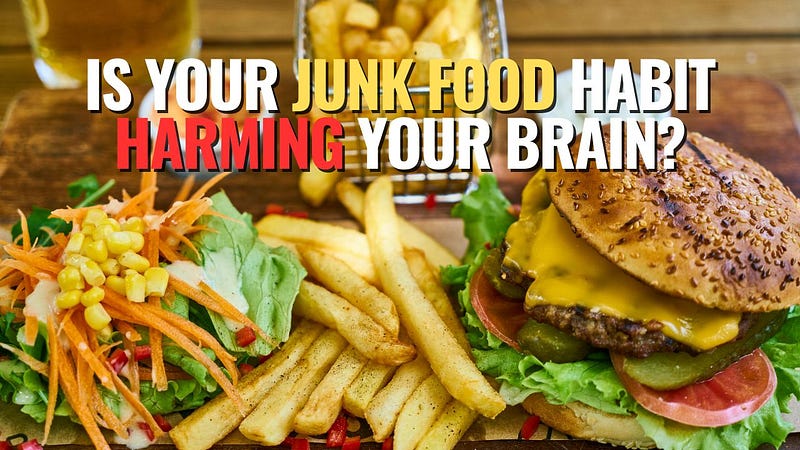The Alarming Impact of Junk Food on Brain Health
Written on
Chapter 1: The Dangers of Junk Food
Recent research has revealed a disturbing truth: excessive consumption of junk food can result in lasting damage to the brain. This primarily concerns meals high in fats and sugars.

[Photo by Engin Akyurt from Pexels]
Experts, including doctors, scientists, and nutritionists, consistently warn about the detrimental effects of fast food, heavily processed snacks, sugary treats, and instant meals. Such unhealthy choices increase the likelihood of developing serious health issues, including atherosclerosis, diabetes, and hypertension. Additionally, these foods contribute to obesity and digestive complications.
Junk Food’s Lasting Damage to the Brain
The latest studies indicate that the consumption of junk food can severely affect cognitive functions. A recent article published in the journal “Brain, Behavior, and Immunity” highlights that a diet typical of the Western lifestyle can impair memory by disrupting acetylcholine flow within the hippocampus, a crucial brain area linked to memory.
Researchers suggest that diets rich in simple sugars and saturated fats may cause permanent memory impairments, as demonstrated in rats that were fed such diets from a young age. They attribute this to the adverse effects these foods have on acetylcholine levels, which is an essential neurotransmitter.

[Photo by Valeria Boltneva from Pexels]
In experiments conducted on rats, Scott Kanoski, a neurologist from the University of Southern California (USC) and co-author of the study, stated, “Our other studies have also shown that if these rats grew up on a ‘junk food’ diet, they have permanent memory impairments.” The researchers emphasize the potential link between long-term consumption of unhealthy foods and an increased risk of Alzheimer’s disease.
During the study, rats aged between 26 and 56 days—analogous to human adolescence—were subjected to a diet high in fats and sugars. Another group was fed a balanced diet. This Western diet is characterized by high levels of processed foods, saturated fats, and sugars, which are associated with excessive calorie intake, obesity, and metabolic disorders. The researchers noted that this type of diet is linked to cognitive dysfunction, particularly during early development stages.

[Photo by Pixabay]
The scientists pointed out, “One of the brain areas particularly vulnerable to adverse dietary effects in early life is the hippocampus. An increasing number of studies on humans and animal models reveal that habitual consumption of the Western diet in early life leads to impaired learning and memory functions. Even in the absence of metabolic dysfunction or weight gain.”
After the feeding phase, the rats underwent memory tests. The group fed junk food struggled to recognize new objects they had seen just days prior, while the healthy-fed group excelled in all memory tasks. The memory issues in the junk food group persisted even after switching to a healthier diet for up to 30 days, equivalent to the transition into adulthood in rats.

[Photo by Vincent Rivaud from Pexels]
The researchers discovered that rats on junk food diets had decreased levels of acetylcholine-transporting proteins in the hippocampus. Imaging studies indicated that the disruption of acetylcholine flow directly impacted cognitive capabilities.
“Acetylcholine in rats is crucial for encoding and recalling events. It operates similarly to ‘episodic memory’ in humans, allowing us to remember past events,” explains Anna Hayes, the study’s lead author. “It appears that this mechanism fails in animals raised on a high-fat and sugary diet,” she adds.
While the findings from these animal studies may not directly correlate with humans, they undeniably illustrate the harmful consequences of a diet heavy in unhealthy foods. “Dietary factors drastically alter gut microbiota. An increasing body of evidence confirms a functional connection between early-life diet, cognitive functions, and changes in gut bacteria,” the scientists conclude.
Chapter 2: Exploring Further Implications
The first video, "Ultra-processed foods will damage your brain! | Prof Felice Jacka," discusses the detrimental effects of processed foods on brain health.
The second video, "Shocking Truth: How Menopause Diet Can Save Your Brain! | Dr. Lisa Mosconi," provides insights into how dietary choices during menopause can significantly benefit cognitive health.
Are Microplastics Deadlier Than We Imagined?
A groundbreaking study by Italian scientists and doctors proves that microplastics accumulate even in arteries, posing…
Dear readers,
I wish to bring attention to an issue affecting content creators like myself on Medium.com. The compensation for our hard work is often minimal, despite our dedication to creating valuable content. If you appreciate my articles, please consider supporting me on my “Buy Me a Coffee” page. Your contributions, no matter how small, can inspire me to continue producing engaging and thought-provoking content. Thank you for being a part of this journey!

